On the square parents were busy tending to their kids and a man was taking his dogs on a leisurely walk. It was like a weekend outing in the park, but with 100,000 companions.
Despite the blazing sun, for more than two hours people kept pouring into the square in front of the Presidential Office to participate in the Campaign for Rectifying the Name of Taiwan.
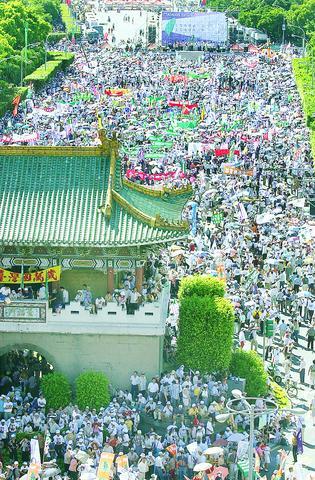
PHOTO: GEORGE TSORNG AND SEAN CHAO, TAIPEI TIMES
Many people wore purple headbands and were dressed in T-shirts with the slogan "Rectifying Taiwan's Name -- Taiwan is the Name of Our Country." Mobile billboards with slogans like "Republic of Taiwan" and "ROC is dead" were seen everywhere and shouts of "Taiwanese" and "Taiwan as a nation" were heard all around.
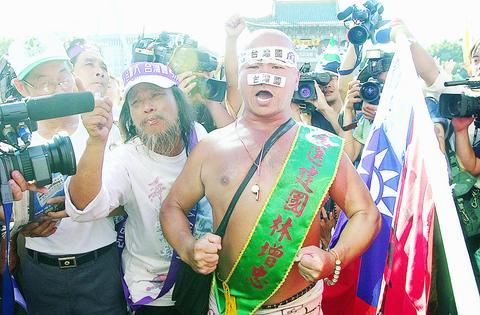
"Foreigners know about Taiwan, but nothing about the Republic of China," said Chen Tsun-hsing (
"I had a few friends in business who often had problems when they went to countries that had little knowledge about Taiwan and customs officials fussed over their passports. It is really necessary to rectify Taiwan's name," Chen said.
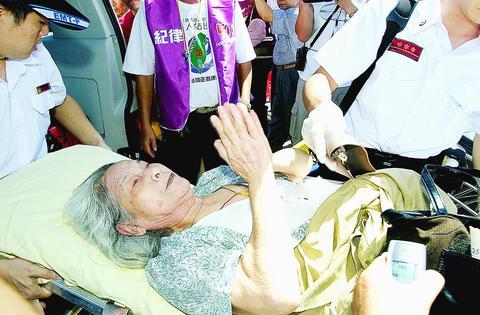
Chen was not alone. There were more expatriates who returned home specifically to support the campaign. Many said that living abroad made them realize the necessity of calling Taiwan by its proper name.
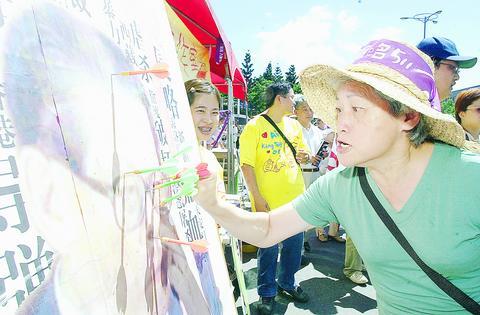
Lin Po-yu (
"My experiences abroad helped me discover the importance of rectifying Taiwan's name. For instance, when I took my passport to apply for credit cards, the bank clerks discriminated against me because they thought I was from China," he said.
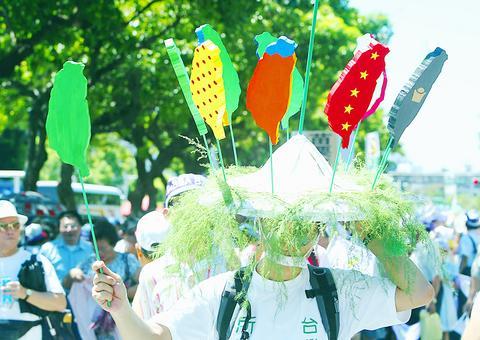
Pan Shui-ching (
"When I was studying abroad, my classmates from Tanzania and Malaysia would sneer at me saying that Taiwan was not a country," Pan said.
"Besides, when my foreign friends watched the opening of the Sydney Olympics on TV, they tried to look for "Taiwan." But they could not find it because we used the name "Chinese Taipei" and they did not know it was Taiwan."
The efforts to rectify the country's name also attracted foreign support.
A big group of Japanese joined in the march, waving and chanting "Cheers Taiwan!" in Chinese.
"Taiwan's independence is necessary for security in the region," said Shinya Goto, a Japanese student of philosophy at Soochow University.
"If Taiwan is forced to merge with China, China may next want to claim Okinawa from Japan, which is quite worrying. So Taiwan's independence is good for Japan, too," he said.
There were also a few Caucasian faces in the march.
"In reality Taiwan is already an independent country and people are basically marching for what already exists. What is lacking now is international recognition" said Andy, an American who has been living in Taiwan for more than four years. He said that he supported the cause and went to the march on his own initiative.
While the campaign attracted a huge crowd, not many local college students were to be seen. Elderly men from rural areas were the dominant figures in the march, thanks to the DPP and TSU's mobilization of their members from the central and southern parts of Taiwan.
"I love Taiwan because I grew up in this country. This is a good effort so I am standing up to voice my support," said Lin An-lu (林安祿), a college student and a Christian mobilized by the Presbyterian Church.
When the 80-year-old former President Lee Teng-hui gave his speech on a stage in front of the Presidential Office, people gathered and listened attentively.
But this may also be the time to ponder whether the ideals of older citizens are equally important to the youth, who are the ones with the power to make the elusive dream come true.

An essay competition jointly organized by a local writing society and a publisher affiliated with the Chinese Communist Party (CCP) might have contravened the Act Governing Relations Between the People of the Taiwan Area and the Mainland Area (臺灣地區與大陸地區人民關係條例), the Mainland Affairs Council (MAC) said on Thursday. “In this case, the partner organization is clearly an agency under the CCP’s Fujian Provincial Committee,” MAC Deputy Minister and spokesperson Liang Wen-chieh (梁文傑) said at a news briefing in Taipei. “It also involves bringing Taiwanese students to China with all-expenses-paid arrangements to attend award ceremonies and camps,” Liang said. Those two “characteristics” are typically sufficient

A magnitude 5.9 earthquake that struck about 33km off the coast of Hualien City was the "main shock" in a series of quakes in the area, with aftershocks expected over the next three days, the Central Weather Administration (CWA) said yesterday. Prior to the magnitude 5.9 quake shaking most of Taiwan at 6:53pm yesterday, six other earthquakes stronger than a magnitude of 4, starting with a magnitude 5.5 quake at 6:09pm, occurred in the area. CWA Seismological Center Director Wu Chien-fu (吳健富) confirmed that the quakes were all part of the same series and that the magnitude 5.5 temblor was

The brilliant blue waters, thick foliage and bucolic atmosphere on this seemingly idyllic archipelago deep in the Pacific Ocean belie the key role it now plays in a titanic geopolitical struggle. Palau is again on the front line as China, and the US and its allies prepare their forces in an intensifying contest for control over the Asia-Pacific region. The democratic nation of just 17,000 people hosts US-controlled airstrips and soon-to-be-completed radar installations that the US military describes as “critical” to monitoring vast swathes of water and airspace. It is also a key piece of the second island chain, a string of

The Central Weather Administration has issued a heat alert for southeastern Taiwan, warning of temperatures as high as 36°C today, while alerting some coastal areas of strong winds later in the day. Kaohsiung’s Neimen District (內門) and Pingtung County’s Neipu Township (內埔) are under an orange heat alert, which warns of temperatures as high as 36°C for three consecutive days, the CWA said, citing southwest winds. The heat would also extend to Tainan’s Nansi (楠西) and Yujing (玉井) districts, as well as Pingtung’s Gaoshu (高樹), Yanpu (鹽埔) and Majia (瑪家) townships, it said, forecasting highs of up to 36°C in those areas